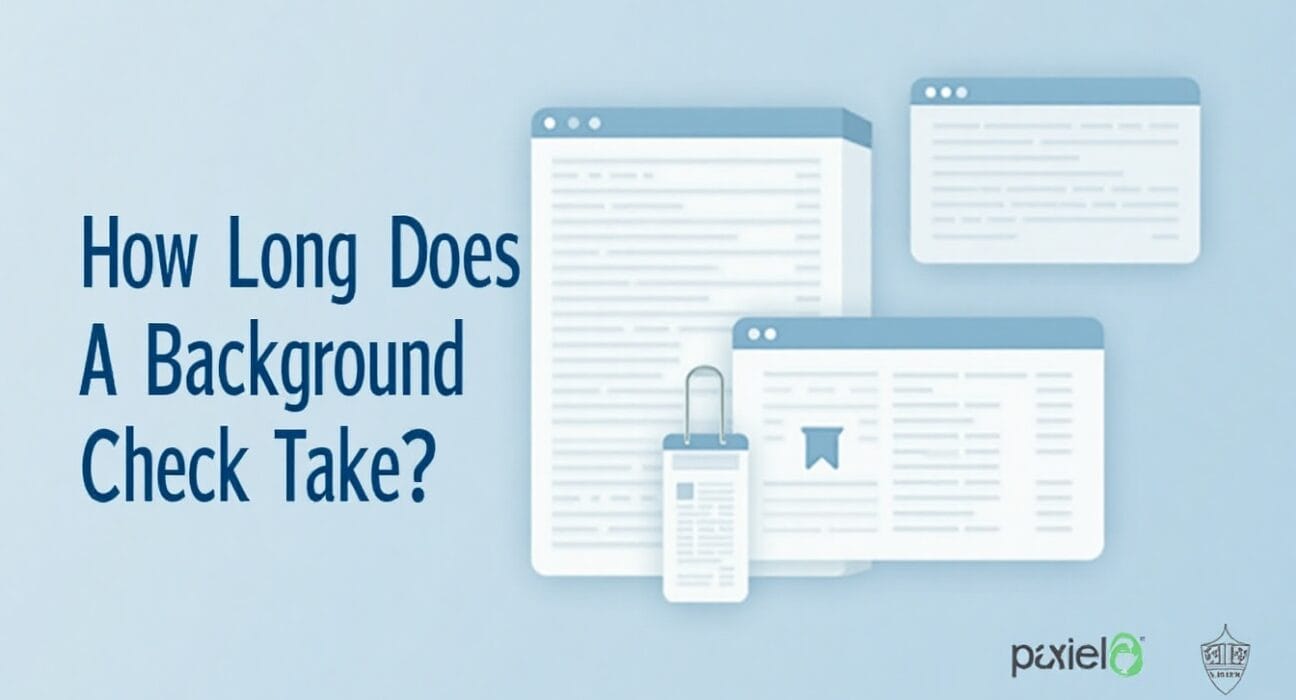Table of Contents
Wondering whether your background check for a new job opportunity has started? Your frustration is justified, and you’re not alone.
Depending on the type of background check conducted, it can take anywhere from several days to just a few minutes. The sources used, how thorough the check is, and how far back the check looks all factor into the duration.
Knowing How Long Does A Background Check Take? enables employers to set accurate expectations and ensure a more efficient hiring process.
What Is a Background Check?
A background check is a way to check if job applicants are telling the truth. It looks into their past, qualifications, and any risks they might pose. This helps employers make smart hiring choices.
Common Purposes of Background Checks
Background checks have several main goals:
- They verify the truth of what job applicants say.
- They look at a candidate’s possible risks and liabilities.
- They help meet legal requirements.
- They aid in making wise hiring decisions.
As noted by the
“The use of background checks has become increasingly common in the hiring process, as employers seek to mitigate risks and ensure a safe working environment.”
National Association of Background Screeners
Types of Organizations That Conduct Checks
Many kinds of groups do background checks. Employers check candidates for jobs. Landlords check people who want to rent. Banks and other financial institutions also do checks to assess risks.
How Long Does A Background Check Take: Average Timeframes
The duration of a background check can vary greatly. Understanding the reasons why assists you in managing your expectations properly and streamlining the process.
Background checks vary in duration. This depends on the type of check performed, the databases accessible, and the level of difficulty in searching.
Typical Duration Ranges
Background checks can take anywhere from a few minutes to weeks. Simple checks, like national criminal database searches, are fast. But more detailed checks take longer.
Instant vs. Comprehensive Checks
Instant checks are quick but limited. They give fast results. But detailed checks that check many sources take longer.
Industry Standards for Turnaround Time
How fast a background check should be varies by industry. Some need quick results, while others can wait longer. Knowing these standards is key to following rules and working efficiently.
Digital vs. Manual Verification Impact
How you verify information affects the time it takes. Digital checks are quicker than manual ones. Manual checks need direct contact with sources, making them slower.
By knowing these details, you can guess how long a background check will take. This helps you plan better.
Factors That Affect Background Check Duration
Knowing what affects the length of a background check helps you prepare. Several things can change how long it takes. It’s important to think about these when you’re waiting for the results.
Scope and Depth of the Check
The more detailed a background check is, the longer it takes. For example, checks that look at criminal records across many states or checks of your work history take longer. This is because they need more information.
Information Accessibility
How easy it is to get the needed information also matters. Digital records are quicker to find than old paper or manual records. This can make a big difference in how fast the check is done.
Verification Requirements
Checking if the information is right is a big part of the process. If you need to call old employers or schools, it takes longer. This is because it adds extra steps.
Applicant Cooperation
How well you cooperate can speed things up. If you give all the right information quickly, the check goes faster.
Jurisdictional Differences
How places keep and share records can also change the time it takes. Some places are better at keeping records digitally, while others might use paper. This can make the time it takes to finish the check different.
The table below shows the main things that can affect how long a background check takes and how they can impact the time:
| Factor | Impact on Duration |
| Scope and Depth | More detailed checks take longer |
| Information Accessibility | Digital records are faster than manual records |
| Verification Requirements | More steps to verify information extend the time |
| Applicant Cooperation | Quick and accurate info makes the process faster |
| Jurisdictional Differences | Different ways of keeping records affect the time it takes |
Types of Background Checks and Their Timeframes
Background checks vary in time based on the type. Each check has its complexity and sources to verify. This affects how long it takes to get the results.
Employment Verification
Employment verification checks involve contacting past employers. It usually takes 1-3 days, depending on the employer’s response time.
Criminal History Checks
Criminal history checks can take 1-7 days. The time depends on the check’s scope and the court system’s efficiency.
Credit Checks
Credit checks are often quicker, taking 1-2 days. This is because credit agencies have efficient processes for reporting information.
Education Verification
Verifying education can take 3-5 days. It involves confirming degrees and attendance with schools.
Professional License Verification
Checking professional licenses usually takes 1-3 days. It involves verifying licenses with the issuing authorities.
Drug Screening
Drug screening results can take 1-5 days. The time depends on the test type and the lab processing the sample.
Knowing these timeframes helps plan your hiring process better. It lets you manage candidate expectations and make informed decisions about your timeline.
Industry-Specific Background Check Timelines
Background check timelines vary by industry. Each sector has its own needs and rules. Knowing these differences helps employers plan their hiring better.
Healthcare Industry
Healthcare needs detailed background checks because of its sensitive work. Providers must verify credentials and check for malpractice. This can take 7 to 14 days or more.
Financial Sector
Background checks in finance are key due to the sensitive information handled. They check employment history, credit, and criminal records. These checks can take 5 to 10 days.
Education and Childcare
Background checks in education and childcare are strict. They check criminal history, qualifications, and sometimes sex offender registries. These checks can take 7 to 14 days.
Government and Public Service
Government jobs require detailed background checks. They check criminal history, finances, and sometimes security clearances. These checks can take 14 days or more.
Transportation and Logistics
Transportation and logistics need background checks for safety and compliance. They check driving records, criminal history, and licenses. These checks usually take 5 to 10 days.
Knowing your industry’s background check timeline is key for hiring. It helps manage the waiting period and follow industry rules.
The Background Check Process Timeline
Having a good grasp of deadlines for a background check is extremely important for the hiring process. Its timeline consists of multiple steps, starting from the background check application to its final report. Every part is crucial for a seamless hiring process.
Initial Application and Consent
The first step is the initial application and consent. Here, the applicant shares personal and professional details and gives consent for the check. This usually happens within a day or on the same day as applying.
Data Collection Phase
Next is the collection of data, which includes acquiring information from public records, former places of employment, and educational institutions. The duration of this process is variable due to the complexity of the check and the responsiveness of the sources involved.
Verification and Analysis
After collecting data, it’s verified and analyzed. This stage checks the information’s accuracy and its relevance to the hiring decision. Verification can take from a few days to weeks, based on the check type and jurisdiction.
Report Generation and Delivery
Once verified, the report is made and sent to the hiring team. This can take a few days to a week, depending on the delivery method and the team’s processes.
Dispute Resolution (If Needed)
If the report has disputed information, a dispute resolution process starts. This involves looking into the disputed items and fixing any errors. The time for this can vary a lot, often taking weeks.
Knowing these stages and their timelines is vital for managing expectations and ensuring a smooth hiring process. By understanding the typical background screening timeline, you can plan and streamline your hiring process better.
- Initial application and consent: 1 day
- Data collection: 3-7 days
- Verification and analysis: 3-14 days
- Report generation and delivery: 1-3 days
- Dispute resolution (if needed): variable
Legal Considerations Affecting Timeframes
When you’re dealing with background checks, it’s key to think about the legal side. Legal rules can change how long it takes to do a background check. Knowing these laws is important for following the rules.
Fair Credit Reporting Act (FCRA) Requirements
The Fair Credit Reporting Act (FCRA) has rules for background checks. It says you need to get the person’s okay first and tell them if you decide not to hire them because of the check. Following the FCRA is very important and can affect how long the check takes.
For example, the FCRA says you must tell the applicant that you might do a background check. You need their written okay and must give them a copy of the report and a summary of their rights if you decide not to hire them. This can make the background check take longer.
State-Specific Background Check Laws
There are also laws in each state that can change how background checks work. Some states have stricter rules or take longer because of their laws. For example, California has laws about using criminal records in job decisions, which can make the check take longer.
| State | Specific Requirement | Impact on Duration |
| California | Ban-the-Box Law | Delays in criminal history checks |
| New York | Fair Chance Act | Requires additional steps before adverse action |
International Background Check Regulations
Background checks in other countries can be even more complicated. They involve different laws and rules from many places. This makes the check take longer. Countries have different rules about privacy and sharing criminal records, which can slow things down.
“The international background check process is fraught with challenges, including varying legal requirements and data privacy laws.”
— Compliance Expert
Pre-Adverse Action and Adverse Action Periods
The FCRA also has rules for before you make a final decision. You must give the person a copy of the report and a summary of their rights. This waiting time can add days to the process. After you make a decision, you have to send more notices, which also affects the time.
It’s very important to understand these legal rules for background checks. Knowing the rules and how they affect the time can help you manage the process better. This way, you can make sure your background checks are done the right way.
Common Delays and How to Avoid Them
Several factors can slow down background checks. Knowing these can help employers manage the process better. This ensures checks are done on time.
Incomplete Information
One big reason for delays is when applicants don’t fill out forms correctly. Making sure all fields are correct can cut down on wait times.
Court System Backlogs
Backlogs in court systems also cause delays. These can happen for many reasons, like not enough resources or too many cases.
International Verification Challenges
Checking records from other countries is hard. This is because of how different places keep records and share information.
Name Variations and Identity Issues
Problems with names and identities can slow things down, too. Using new tech can help solve these problems.
Strategies for Preventing Delays
To avoid delays, employers can try a few things:
- Keep in touch with applicants to get all the info needed.
- Use the latest tech to make the process faster.
- Plan and give enough time for the check.
- Keep the check process up to date to find and fix problems.
By knowing what causes delays and using strategies to fix them, you can make background checks faster. This makes the whole process smoother.
How long does a typical background check take?
Based on the kind of check needed and the amount of info required, background checks may take a few days to several weeks.
How long does employment verification typically take?
Verifying employment usually takes one to three days. This involves contacting the applicant’s past employers.
How long does it take to receive the results of a background check?
The time to get background check results varies. It depends on the type of check and the sources used. Generally, it takes a few days to several weeks.
Can delays occur during the background check process?
Yes, delays can happen. They might be due to missing or wrong information from the applicant, court system backlogs, or verifying records from other countries.
What role do legal considerations play in the background check process?
Laws, like the FCRA, and state and international rules, play a big role. They affect how long checks take and must be followed to ensure the checks are valid.
Conclusion
You have just learned that the timing for a background check to be completed can widely differ. This is dependent on the kind of check, the sources noted, and even the legal regulations. While hiring, these factors are important in making the right decisions.
The time it takes for a background check is perceived to be long. However, if you know the things that affect the duration, then your planning can be improved. By managing these aspects, you stand to gain in streamlining the process and enhancing your hiring decisions.
This is a developing field, and it requires constantly keeping up with the changes. All relevant information within the field is necessary for both sides: employers as well as job seekers. This prepares all parties involved for the check and helps streamline the process for everyone.






